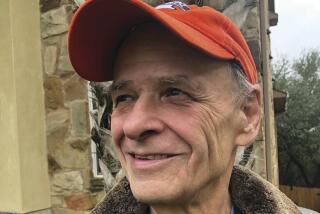Disabled Historian Burns Book Over Threat to Benefits
Paul Longmore watched a copy of a book that took him 10 years to write go up in smoke Tuesday. And he lit the match.
Book burnings often are expressions of intolerance, but this one in front of the Federal Building downtown was a protest against regulations governing federal disability programs run by the Social Security Administration.
Longmore, a 42-year-old historian whose upper body is twisted and partially paralyzed from polio, claims that the regulations penalize people who want to earn money and achieve at least partial independence.
In his case, the government’s judgment that his royalty payments are unearned income, as opposed to wages, may cost him all his government benefits.
Having earned his doctorate at Claremont Graduate School in 1984, Longmore’s goal is to teach history at a college and to write history books. He expects to make about $10,000 in royalties from his book, a biography of George Washington, in the next several years. That will not come close to replacing his monthly check of $575 and the $20,000 a year in Medi-Cal and in-home services that are derived from his eligibility for federal assistance. Once Longmore has spent most of his royalty money, he may be allowed to rejoin the disability program.
“I have a major disability from polio and cannot use my arms,” he said. “But I managed to get a Ph.D. in history and through this book I could get the professional accomplishments to move ahead and get a teaching job,” the Eagle Rock resident said.
Both Longmore and a spokesman from Social Security say that if his royalties were considered “earned income” he would be able to retain his eligibility for reduced payments and his state benefits as well.
Social Security spokesman Roy Aragon said the government examines each case as it comes up and is usually flexible in how it rules. But he acknowledged that, according to government regulations, Longmore’s royalties are unearned income and he could lose his disability benefits.
Longmore said he may have been able to stop the University of California Press from publishing his book and avoid risking his benefits. But that would have hurt his chances of getting a teaching position.
So, to advance his career--and as a matter of principle--he has decided to challenge the rules. He said he may take his case to court or petition the Internal Revenue Service to declare the royalties earned income.
Longmore said that Tuesday’s protest was intended to generate public support to change rules that he and others say work to defeat disabled people who want to work and support themselves.
About 40 protesters, many of them disabled, joined Longmore outside the Federal Building on Los Angeles Street. They moved in a small circle chanting “Let Us Work,” as Longmore prepared to burn a copy of “The Invention of George Washington” on a small barbecue grill. As the flames quickly consumed the book, the crowd burst into a rendition of “We Shall Overcome,” later altering the the lyrics to “we shall work and live.”
Longmore and other disabled rights advocates say that because of the rules governing the Supplemental Security Income program and Social Security Disability Insurance, a small amount of work income can often result in a drastic loss of benefits and support services that enable many disabled people to live outside of institutions.
“We are addressing the public, not the government, which ignores us,” Longmore said. “We are intending to abolish work disincentives and want public support for it.”
Longmore believes the able-bodied have a stake in his cause.
“We are the only minority you can join,” he said. “All you have to do is get in a car accident. And if you are disabled the government forces you to impoverish yourself before you can get the help you need.”
Longmore said his group is protesting rules governing the disability insurance program that jeopardize a person’s benefits if he makes more than $300 a month for nine months. They also want changes in the SSI program that count research grants and book royalties as unearned income and that sometimes force couples to include some income from an able-bodied spouse when determining benefits. About 6 million people are served by the two programs.
But a spokesman for Social Security said that although the regulations for the disability programs are complicated, they help rather than hurt aid recipients.
“I would say, on the contrary, there are incentives to work in those programs,” said Social Security spokesman Aragon. “If a person is going back to work, they can try and if they cannot make it they can fall back on the programs.”
More to Read
Sign up for our Book Club newsletter
Get the latest news, events and more from the Los Angeles Times Book Club, and help us get L.A. reading and talking.
You may occasionally receive promotional content from the Los Angeles Times.





